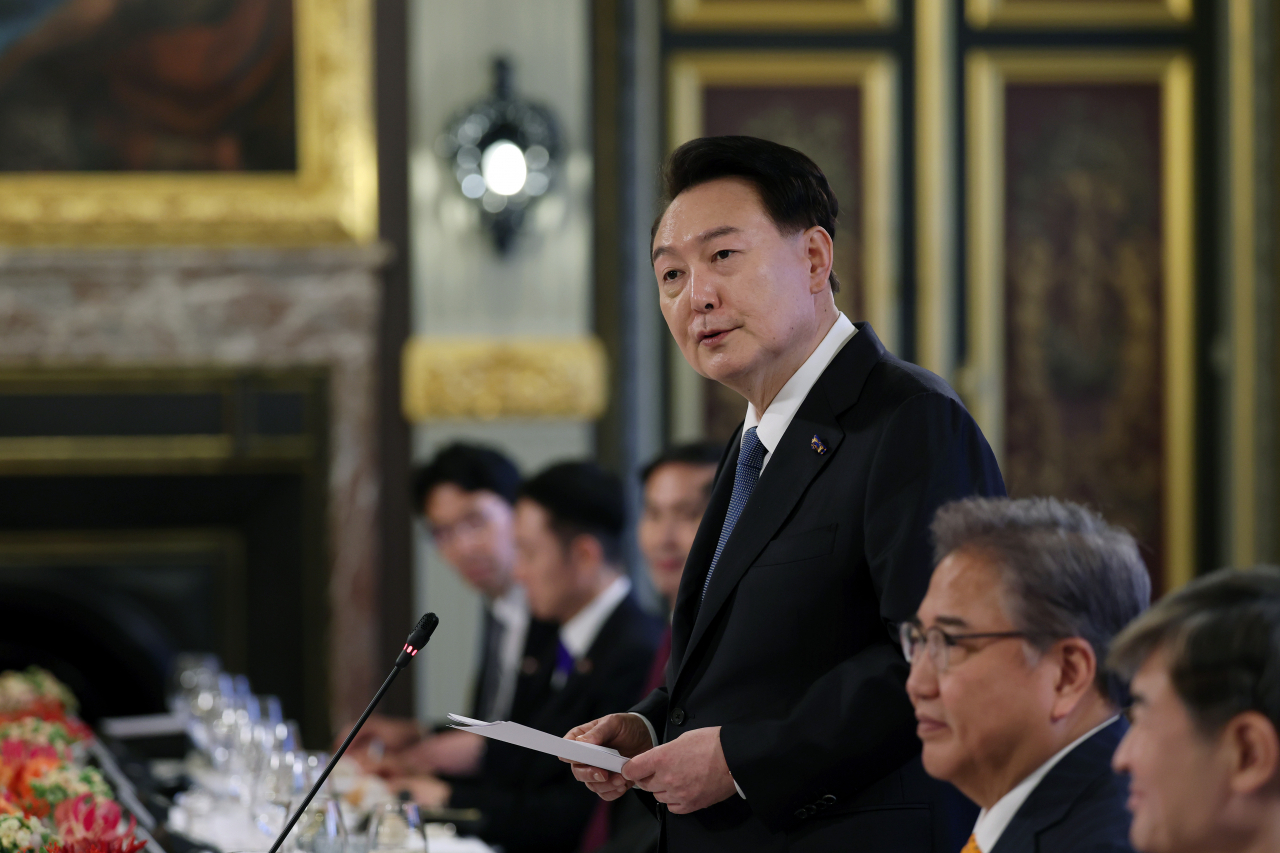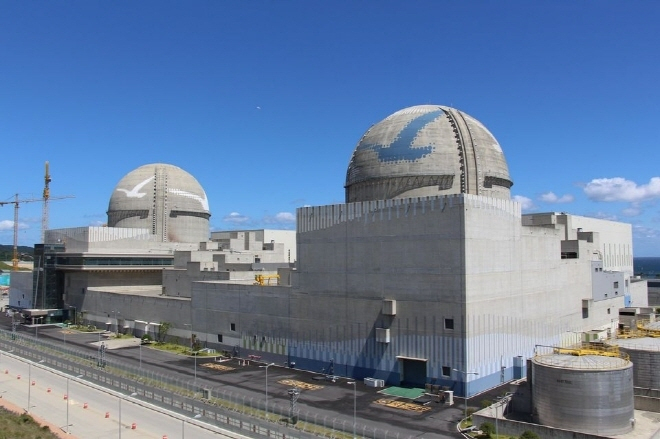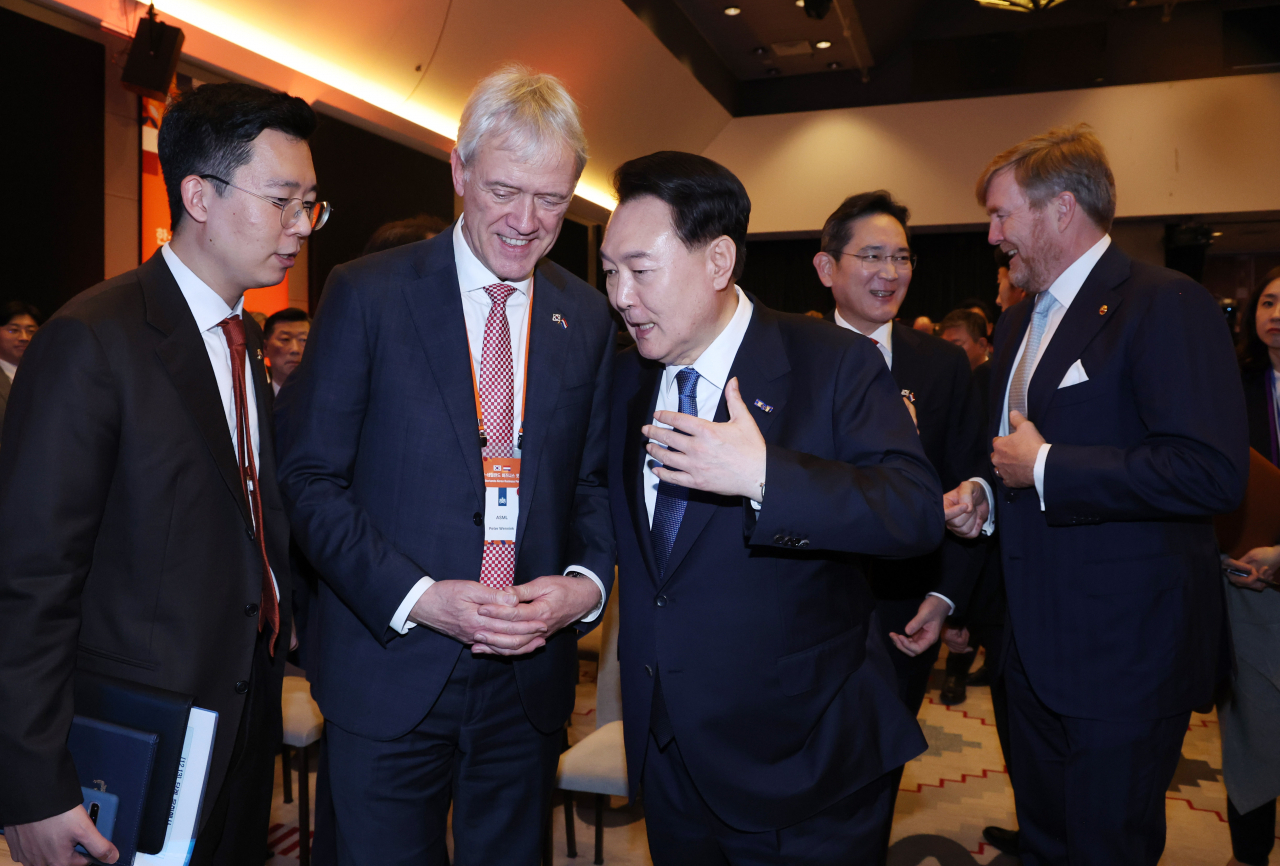Yoon vows backing for Korea's Dutch nuclear power plant bid
President wraps up Dutch state visit with 'economic security' in focus
By Son Ji-hyoungPublished : Dec. 14, 2023 - 18:12

President Yoon Suk Yeol pledged his support for South Korea's bid to build two new nuclear power plants in the Netherlands, as he wrapped up his five-day state visit to the European country which faces energy transition pressure due to geopolitical uncertainties.
"I will actively support South Korean companies, boasting world-class plant engineering capabilities, to participate in new projects to build nuclear power plants in the Netherlands, based on the agreements signed today," Yoon told some 200 business leaders from South Korea and the Netherlands at a business forum held in The Hague.
At the forum, Korea Hydro and Nuclear Power signed an agreement with the Dutch Ministry of Economic Affairs and Climate Policy over the technical feasibility assessment of its nuclear power plant construction plan. The KHNP is a subsidiary of the state-run Korea Electric Power Corp.
The signing of the memorandum of understanding translates into "a formal bidding for the project" to build two Dutch nuclear power plants by 2035, the Ministry of Industry, Trade and Energy said in a statement.
In the same vein, Kepco Nuclear Fuel, another subsidiary of the utility Kepco, signed a separate memorandum of understanding with Dutch consulting firm NUCLIC to help South Korean companies localize and study nuclear-related rules and regulations in the Netherlands.
These came separately hours after South Korea's Industry Ministry and the Netherlands' Ministry of Economic Affairs and Climate Policy agreed to foster bilateral cooperation in the use of nuclear power.
Under Wednesday's joint statement by Yoon and Dutch Prime Minister Mark Rutte, the two leaders will cooperate over the construction and operation of nuclear power plants; workforce development; nuclear fuel; safety; and innovation of gigawatt-scale nuclear reactors, small modular reactors and other advanced nuclear reactors.
Park Chun-sup, presidential senior secretary for economic affairs, said Wednesday at a briefing that the agreement between the governments, in addition to the launched bid, could be "helpful" for KHNP.

The Netherlands currently operates one nuclear power plant, which produces 3 percent of the nation's electricity. It seeks to launch the operation of two new power plants in 2035. The bidder selection process is anticipated in 2025.
In the wake of the war in Ukraine that prompted gas supply disruptions, coupled with its bid to achieve carbon neutrality by 2040, there have been growing calls for the Dutch government to diversify energy sources, primarily by extending the life of the current nuclear power plant and building two more, according to Yoon's office.
The KHNP is considered one of the interested parties, along with US-based Westinghouse and French state-owned EDF, the presidential office also noted.
These were among 30 deals signed between the two countries during Yoon's state visit this week. During the business forum, 19 new agreements encompassing the fields of semiconductors, clean energy, logistics and agriculture were signed.
The agreements highlighted the need for the two countries to jointly address the economic vulnerabilities in case of supply chain disruptions due to geopolitical unrest.
Economic security was in primary focus during Yoon's trip, a first-ever state visit to the Netherlands as a South Korean head of state, given the two countries' strategic dependencies on one another in the global supply chain of key components such as semiconductors.
Stipulated in the joint statement by Yoon and Dutch Prime Minister Mark Rutte is a newly established biennial dialogue of foreign ministers and industry ministers of the two countries, to implement the bilateral strategic partnership agreement signed in November 2022.
One of the deals signed pertaining to what was dubbed "semiconductor alliance" during Yoon's state visit was South Korean chipmaker Samsung Electronics' 1 trillion won ($762 million) spending package with Dutch semiconductor printing machine supplier ASML to jointly build a research center in South Korea. Details have yet to be announced.

Yoon's senior secretary Park told reporters Wednesday after the joint statement that the deal will "set the stage for the South Korean company to gain an upper edge over international competitors to succeed in the 2-nanometer process," adding that ASML's next-generation lithography machine is crucial to the mass production of microchips with the world's most advanced technology node.
Earlier in June, Samsung's foundry business unveiled their blueprint to make 2nm chips in 2025, as the race to ship the world's first 2nm chip is intensifying between Samsung, Taiwan-based TSMC and US firm Intel.
"The stable procurement of the next-generation (chip circuit printing machine) is a decisive factor in the world's race for chip advancement," Park added, given the limited lithography machine production capacity of ASML.
Yoon's state visit also created room for the Netherlands' further Indo-Pacific commitment, according to the presidential office.
Yoon and Rutte "stressed the importance of a free, open and inclusive Indo-Pacific, and agreed to strengthen cooperation with regard to their respective Indo-Pacific Strategies," read the statement.
The statement also indicated plans for further military and defense cooperation between the two countries in the face of geopolitical threats, as well as an "exchange between knowledge institutes" of respective countries on Indo-Pacific regional issues.





![[KH Explains] No more 'Michael' at Kakao Games](http://res.heraldm.com/phpwas/restmb_idxmake.php?idx=644&simg=/content/image/2024/04/28/20240428050183_0.jpg&u=20240428180321)














